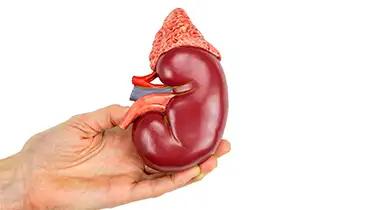The Organ Donation Day campaign, which is celebrated every year at August 13th, provides a great opportunity in everyone’s life to come ahead and pledge to donate their precious organs. At Wockhardt Hospital we support this imitative and hope that in doing further spread our ethos in making life win.
Approximately 5 lakh people across the nation die each year.
- Every year, about 5 lakh people die awaiting organ transplants due to non-availability of organs
- There is a wide gap between the number of transplants awaited and the organs available.
- The depressing statistics convey the urgent need for more people to step and donate their organs; save the lives of people languishing due to organ failure.
- One organ donor can save more than 8 lives in his life by donating his well function organs.
Objectives of Organ Donation Day
- To aware the people about the need of organ donation.
- To distribute the messages of organ donation all over the country.
- To remove the hesitations of the people about donating organs.
- To say a grateful thanks to the donors of organs.
- To motivate and encourage more people towards organ donation in their life.
What is Organ Donation?
Organ Donation is the gift of an organ to a person who needs a transplant to improve his condition and health status. It is a procedure in which a health organ (donor) is taken from an individual who is either living or deceased and is transplanted into a person whose respective orphan (recipient) is malfunctioning.
Donated organs give the recipient the opportunity of a longer and better quality of life.
Is it a Legal Procedure?
Yes it is a legal procedure. It is governed by a transplant regulatory body and special acts laid down by authorities. All institutions conducting transplants have to be registered under the government and follow rules and regulations.
Which Organs (For Transplant Surgery ) Can Be Donated?
- Kidney
- Lungs
- Heart
- Eye
- Liver
- Pancreas
- Cornea
- Small Intestine
- Skin tissues
- Bone tissues
- Heart valves
- Veins
What Are the Different Types of Organ Donation?
- Live Related Donation: Living donation takes place when a living person donates an organ (or part of an organ) for transplantation to another person. The living donor can be a family member, such as a parent, child, brother or sister, grandparent or grandchild (living related donation).
- Live Unrelated Donation: Living donation can also come from someone who is emotionally related to the recipient, such as a good friend, a relative, a neighbour or an in-law (living unrelated donation).
- Deceased/Cadaver Organ Donation: The patient has to register in a hospital that does transplants. The patient will be put on a waitlist. As and when the organ from an appropriate deceased donor (brain death) is available, the patient will be intimated.
When Are Organs Removed After Death?
Organs must be removed as soon as possible after the determination of brain death, while circulation is being maintained artificially. Tissues may be removed within 12 to 24 hours.
What is Brain Death? (Cadaver Transplant)
Brain death results from a severe, irreversible injury to the brain. All areas of brain are damaged and no longer function due to which a person cannot sustain his/her own life, but vital body functions may be maintained by an artificial support system. This maintains circulation to vital organs long enough to facilitate organ donation. People who experience brain death also donate tissues.
Which Organs Can Be Donated After Brain Death?
Vital Organs like heart, liver, kidneys, intestines, lungs, and pancreas can be donated only in case of ‘brain death’. However other tissues like corneas, heart valves, skin, bones etc. can be donated only in case of natural death
Can a Donor Donate Organs After a Cardiac Death?
No. Cardiac death results when the heart and breathing cease to function. All organs and tissues in the body suffer from lack of oxygen, circulation and die. People who have a cardiac death cannot be organ donors however they can donate tissues after death.
Who Certifies That a Patient is Brain Dead?
The Government has specified that a panel of doctors will certify brain death and not a single doctor. The panel consists of:
- Doctor in charge of the hospital (medical superintendent)
- Doctor nominated from a panel of Doctors appointed by the Appropriate authority
- Neurologist/neurosurgeon/intensivist nominated from a panel appointed by the appropriate authority
- Doctor treating the patient
Who Authorises Organ Donation?
A recipient list (waiting list) for receiving organs is maintained in a register with the Zonal Transplant Coordination Centre) who is responsible for allotting the organs.
In India Why is the Family So Important in Case of Organ Donation?
- In many western countries an adult is asked to make a choice if he/she wants to be a donor.
- In India, this final choice is left to the family. In case of brain death of a person carrying a donor card, the family still needs to approve the donation of organs. Family consent is essential for trans-plantation.
- The Transplantation of Human Organs Act states that it is mandatory that the next of kin (parents, spouse, etc.) should agree to donate the organs of a brain dead family member.
Is Organ Donation Safe?
All potential donors are screened for ruling out transmitted diseases such as HIV AND HEPATITIS.
Can I donate if I have a medical condition?
The medical condition will be assessed at the time of organ donation to see if you are fit candidate for the same.
Are There Any Criteria for Evaluating Donors?
Yes certain tests like blood group, immunological status and medical taken. The donors tissue matching and compatibility with recipient is vital consideration for transplant surgery.
Why is Family Support Important in Pledging Your Organs?
It is important to discuss your decision with family or next of kin. This is because in case of an emergency or an untoward incident, your family will be the first to be contacted. Only after seeking their permission can the doctors go ahead with retrieving your organs. If your family is aware of your decision, your wishes will be carried out the way you would have liked.
In scenarios where the families are not aware and need to be counselled on the wishes of their deceased relative, a lot of precious time is lost and sometimes the opportunity to donate is gone. In Organ donation, time is of prime importance. It is essential for the organs or tissues to be removed as
When is Consent Required for a Minor?
If you are less than 18 years old, then your parents’ consent is required for organ donation. So if you want to become a donor, it’s important to tell them that you wish to donate. Children too are in need of organ transplants, and they usually need organs smaller than those an adult can provide.
How Can I Pledge My Organs?
You can pledge by simply filling up an organ donation card, Carry it around with you and mention personal details and family member who is aware of your decision as consent to go ahead with the procedure. You will also need to specify the organ you which to donate to save a life.












